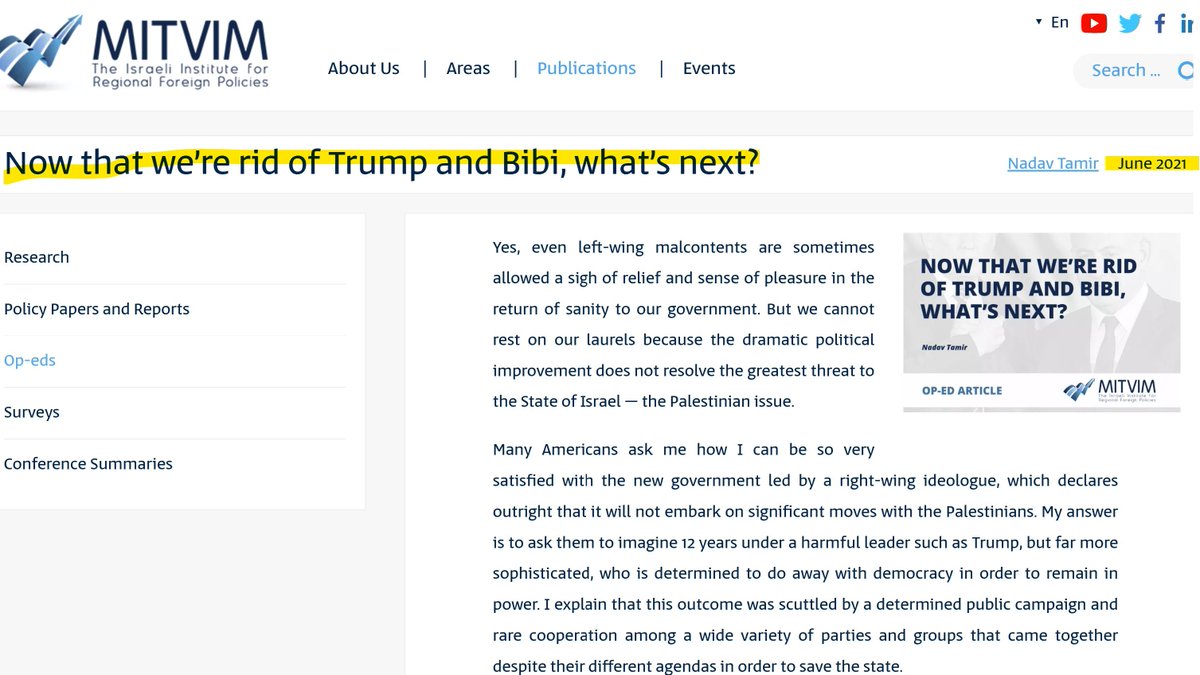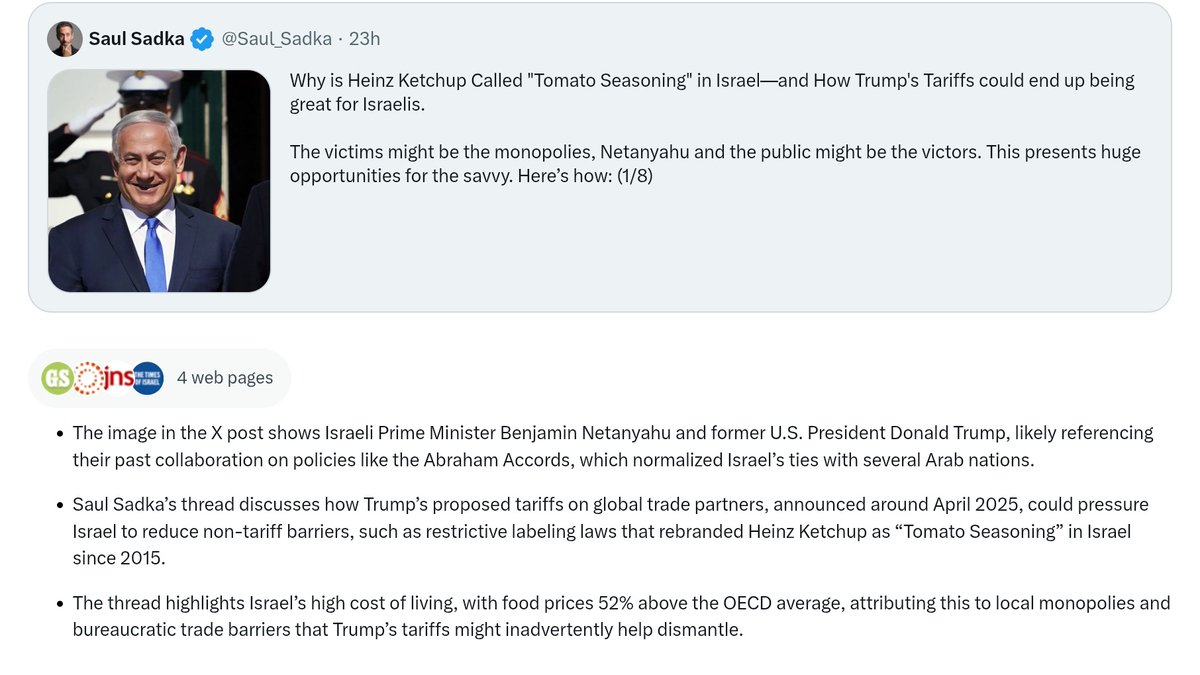Why is Heinz Ketchup Called "Tomato Seasoning" in Israel—and How Trump's Tariffs could end up being great for Israelis.
The victims might be the monopolies, Netanyahu and the public might be the victors. This presents huge opportunities for the savvy. Here’s how: (1/8)
The victims might be the monopolies, Netanyahu and the public might be the victors. This presents huge opportunities for the savvy. Here’s how: (1/8)

When Israel announced a few days ago that it was cancelling all tariffs on American goods, it was essentially bluffing.
There have been virtually no tariffs on American goods for over 30 years. The total amount collected annually was around $40 million — about 0.02% of the Israeli government’s budget. (2/8)
There have been virtually no tariffs on American goods for over 30 years. The total amount collected annually was around $40 million — about 0.02% of the Israeli government’s budget. (2/8)

One of the major issues with Israel’s otherwise thriving economy is the high cost of goods, especially groceries, which are on average 50% more expensive than in other OECD countries.
So why hasn't anyone taken advantage of the obvious arbitrage opportunity? If there are no tariffs on American goods, wouldn’t enterprising individuals flood the Israeli market with American products, bringing prices down to U.S. levels (plus shipping and local distribution)? (3/8)
So why hasn't anyone taken advantage of the obvious arbitrage opportunity? If there are no tariffs on American goods, wouldn’t enterprising individuals flood the Israeli market with American products, bringing prices down to U.S. levels (plus shipping and local distribution)? (3/8)

Because the problem was never tariffs it’s the myriad other trade barriers, implemented by a government heavily lobbied by local conglomerates (who also happen to be the biggest advertisers in Israeli media).
Two examples: (4/8)
Two examples: (4/8)
Imagine you're a local ketchup producer — say, Osem. Your ketchup doesn’t taste great, and you can’t compete with Heinz, which benefits from global economies of scale. Then Heinz lands in the market. What do you do? Compete on price? Improve your formula?
Of course not. Instead, you use lobbyists and friendly bureaucrats (some of whom wouldn’t mind a future seat on your board) to create a new legal definition of "ketchup" — one that only your product fits. Heinz, suddenly, is no longer allowed to market itself as ketchup. If they want to stay in the game, they have to relabel as “Tomato Seasoning.” And so it was. (5/8)
Of course not. Instead, you use lobbyists and friendly bureaucrats (some of whom wouldn’t mind a future seat on your board) to create a new legal definition of "ketchup" — one that only your product fits. Heinz, suddenly, is no longer allowed to market itself as ketchup. If they want to stay in the game, they have to relabel as “Tomato Seasoning.” And so it was. (5/8)

Now imagine you're one of only two small farms in Israel growing pineapples. The climate is poor for growing pineapples, and pineapples are labor-intensive, so your costs are high. But then how come big, juicy pineapples in the UK (with higher labor costs and worse weather) sell for $3, while scrawny, sad pineapples in Israel cost $12?
You guessed it: you’re not in the pineapple business. You’re in the lobbying and bureaucracy business. For 30 years, you’ve fought to make pineapple imports as complicated and expensive as possible — and you've succeeded.
(After much public pressure, the pineapple market was opened up partially, leading to an instant halving in the price of pineapples.)
And these are just two examples out of thousands. In each case, the result is the same: a quiet, steady transfer of wealth from consumers to producers, bureaucrats, and conglomerates. (6/8)
You guessed it: you’re not in the pineapple business. You’re in the lobbying and bureaucracy business. For 30 years, you’ve fought to make pineapple imports as complicated and expensive as possible — and you've succeeded.
(After much public pressure, the pineapple market was opened up partially, leading to an instant halving in the price of pineapples.)
And these are just two examples out of thousands. In each case, the result is the same: a quiet, steady transfer of wealth from consumers to producers, bureaucrats, and conglomerates. (6/8)

Often, it doesn’t even protect local jobs. In many cases, the beneficiaries are merely exclusive importers.
Tariffs were never the issue. The real barriers are the bogus certification requirements and restrictive import licensing, which vested interests use to block foreign competition. Simply allowing American or European certified goods (whose standards are generally higher anyway) to enter Israel freely and without limit would revolutionize the Israeli market — to the enormous benefit of consumers.
The Israeli Standards Institute replicates the work of EU and US standards bodies, but for the tiny Israeli market. This is great for its well paid employees, but bad for Israel. (7/8)
Tariffs were never the issue. The real barriers are the bogus certification requirements and restrictive import licensing, which vested interests use to block foreign competition. Simply allowing American or European certified goods (whose standards are generally higher anyway) to enter Israel freely and without limit would revolutionize the Israeli market — to the enormous benefit of consumers.
The Israeli Standards Institute replicates the work of EU and US standards bodies, but for the tiny Israeli market. This is great for its well paid employees, but bad for Israel. (7/8)

The government could eliminate most of this nonsense tomorrow, and over 90% of the public would support it. The only reason it doesn’t happen is because a huge share of Israeli lobbying power — and media ad revenue — is tied to keeping things exactly the way they are.
Netanyahu is, at heart, a free-marketeer. Interestingly, the major conglomerates are mostly aligned with his political opponents. Passing a law that would let Walmart, for example, open 100 stores and sell its full range of products at 30% of what Israelis currently pay would make him wildly popular.
The Trump tariffs might just be the excuse needed to finally make this happen. Vested interests that have blocked this for decades could be told: “Sorry, Trump forced our hand.”
As a bonus, here is a hilariously prescient article from @rntamir in 2021... (8/8)
Netanyahu is, at heart, a free-marketeer. Interestingly, the major conglomerates are mostly aligned with his political opponents. Passing a law that would let Walmart, for example, open 100 stores and sell its full range of products at 30% of what Israelis currently pay would make him wildly popular.
The Trump tariffs might just be the excuse needed to finally make this happen. Vested interests that have blocked this for decades could be told: “Sorry, Trump forced our hand.”
As a bonus, here is a hilariously prescient article from @rntamir in 2021... (8/8)

One option to butter up the Ameircan admin might be to cut the duties and luxury tax on American imported cars—perhaps specifically or especially on ELECTRIC CARS 😉—this would please all the right people in all the right places without any major shock to Israeli producers...
• • •
Missing some Tweet in this thread? You can try to
force a refresh

















